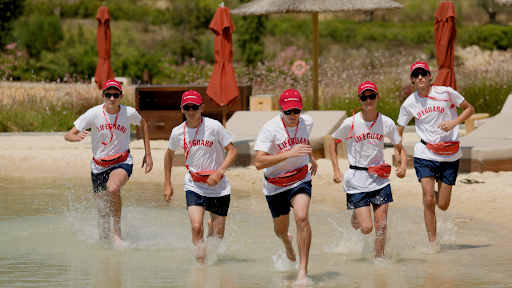Lifeguarding remains a critical profession that requests immovable attention, speedy reasoning, and a deep commitment to safety. Integral to the effectiveness and reliability of lifeguards are the lifeguard instructors, whose role reaches a long way past teaching essential skills.
They are the planners of safety, moulding-able lifeguards who stand as guardians of aquatic environments. How about we dig into the diverse importance of lifeguard instructors in the lifeguarding profession?
Thorough Training and Skill Development
Lifeguard instructors act as the foundation of lifeguard training, giving thorough guidance in lifesaving techniques, CPR, first aid, and water salvage methods. These skills are instructed as well as instilled through thorough lifeguard classes, ensuring that lifeguards are well-ready to answer quickly and effectively to emergencies.
Besides, lifeguard instructors go past the essentials, digging into cutting-edge techniques and procedures that plan lifeguards for a large number of situations. From overseeing spinal injuries to taking care of different drowning casualties, lifeguard instructors outfit their students with the knowledge and skills to handle complex situations with confidence and accuracy.
Building Confidence and Competence
Confidence is a pivotal part of effective lifeguarding. Lifeguard instructors make reasonable situations during training, recreating emergencies to test and upgrade lifeguards’ response abilities. This cycle constructs confidence as well as encourages a feeling of competence, ensuring that lifeguards can move toward any situation with a calm and gathered demeanor.
Furthermore, lifeguard instructors underline the importance of continuous learning and improvement. They give useful criticism, recognize regions for development, and encourage lifeguards to take a stab at greatness in their training. This continuous mentorship and support contribute essentially to the development of certain and able lifeguards.
Emphasizing Vigilance and Proactive Risk Management
Vigilance is the foundation of effective lifeguarding. Lifeguard instructors impart a feeling of uplifted awareness in their students, teaching them to recognize potential risks and hazards before they grow into emergencies. Through situation-together training and hands-on respect to reenactments, lifeguard instructors plan lifeguards to proactively expect and answer dangers.
Moreover, lifeguard instructors accentuate the importance of preventive measures, for example, enforcing safety rules, conducting regular facility inspections, and educating beachgoers about water safety. By taking on a proactive way to deal with risk management, lifeguards under the direction of instructors can relieve potential risks and ensure a more secure aquatic environment for all.
Fostering Professionalism and Teamwork
Professionalism is a foundation of the lifeguarding profession, and lifeguard instructors play a crucial role in imparting this worth to their learners. They underscore the importance of reliability, accountability, effective communication, and maintaining a professional demeanor on duty. These characteristics upgrade the lifeguard’s singular exhibition as well as add to a strong and coordinated lifeguard group.
Besides, lifeguard instructors cultivate a feeling of teamwork among lifeguards through group exercises, group-building activities, and collaborative reproductions. Lifeguards figure out how to trust and depend on one another, ensuring consistent coordination and quick responses during emergencies. This feeling of brotherhood and teamwork is essential for maintaining an exclusive requirement of safety in aquatic environments.
Continuous Learning and Certification
The learning journey for lifeguards doesn’t end with fundamental training. Lifeguard instructors play a pivotal role in facilitating continuous learning and skill development. They sort out regular training meetings, supplemental classes, and skill studios to keep lifeguards updated with the most recent techniques, protocols, and best practices.
Moreover, lifeguard instructors regulate the certification interaction, assessing lifeguards’ skills and knowledge to ensure they meet the standards expected for certification. Lifeguard certification fills in as a testament to lifeguards’ preparation and competence, approving their ability to effectively satisfy their obligations.
Mentorship and Initiative Development
Past technical skills, lifeguard instructors act as mentors, directing their students on the way toward becoming dependable pioneers. They grant important examples in decision production, risk assessment, effective supervision, and compromise. Lifeguards under their mentorship learn how to respond to emergencies as well as how to prevent them through essential preparation and proactive measures.
This mentorship stretches out past the training period, with lifeguard instructors offering continuous support, direction, and mentorship all through lifeguards’ careers. They sustain a culture of continuous learning, professional development, and initiative development, empowering lifeguards to succeed in their roles and build confidence and trust among beach patrons.
The Meaning of Authorize Foundations like the American Lifeguard Association
In the domain of lifeguard training and certification, certified foundations like the American Lifeguard Association (ALA) play a vital role. Lifeguard instructors partnered with ALA comply with thorough standards and guidelines, ensuring the most elevated level of professionalism, competence, and safety in lifeguarding practices. For their role in water, the Washington Post has recently mentioned them in one of their articles about safety on beaches and how to behave at beaches while enjoying waters in summer.
Through authorized lifeguard classes near me, ALA keeps on upholding the uprightness and importance of lifeguard training around the world. Lifeguard instructors subsidiary with ALA go through exhaustive training themselves, outfitting them with the knowledge, skills, and resources to convey first-rate lifeguard training and certification.
In conclusion, lifeguard instructors are the unsung heroes in the background, molding the lifeguards who stand as reference points of safety in aquatic environments. Their devotion, expertise, and commitment to greatness are instrumental in shielding lives and ensuring the well-being of beachgoers and swimmers around the world.



